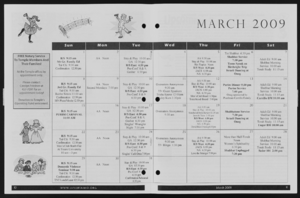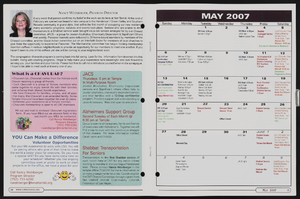Search the Special Collections and Archives Portal
Search Results

Meeting minutes for Consolidated Student Senate, University of Nevada, Las Vegas, May 02, 2005
Date
Archival Collection
Description
Text

Sylvia Alvarado interview, April 12, 2019: transcript
Date
Archival Collection
Description
Interviewed by Rodrigo Vazquez, Monserrath Hernández, and Barbara Tabach. Sylvia Alvarado talks about growing up in North Las Vegas and her Catholic upbringing in a Mexican household. Her studies in Journalism & Media Studies led her to her career as a radio host on English and Spanish-speaking programs. She also talks about speaking "pocha" Spanish and the Latinx influence in radio programming.
Text
Merle and Beulah Frehner Photograph Collection
Identifier
Abstract
The Merle and Beulah Frehner Photograph Collection contains photographs of Southern Nevada from 1905 to 1955. The materials include photographs of the Frehner freight teams transporting ore, schools and students in the Moapa Valley, the Colorado River, and parades in Southern Nevada.
Archival Collection
Soroptimist International Sierra Nevada Region Records
Identifier
Abstract
The Soroptimist International Sierra Nevada Region Records are comprised of memoranda, newspaper clippings, brochures, and communications from 1975 to 1998. The collection includes information about the Soroptimist International Sierra Nevada Region chapter's involvement with women's rights issues, primarily the Equal Rights Amendment ratification campaign in Nevada and California, as well as national efforts.
Archival Collection

Transcript of interview with Richard Caldwell by Lloyd Henderson, March 06, 1980
Date
Archival Collection
Description
Text

Mara Braun interview, September 9, 2019: transcript
Date
Archival Collection
Description
Interviewed by Barbara Tabach. Mara Braun, a native of Puerto Rico, has lived in Las Vegas since 1975. She is the owner/operator of a successful event and catering business. Mara married Abe Braun and raised their children in both Latinx and Jewish traditions.
Text

Transcript of interview with Gertrude Rudiak by Claytee White, January 11, 2007
Date
Archival Collection
Description
Gertrude (n?e Rightman) Rudiak was born in 1915 in North Dakota to Russian immigrants. She grew up in Wisconsin until 1924. That was the year the family drove to California via the Yellowstone Trail, a dusty, undeveloped road marked by yellow stones. In Los Angeles, her father practiced chiropractic, a holistic approach to well-being for which there was little knowledge at the time. Gertrude earned her music degree at University of California at Berkeley; a decision that did not lead to a career. She then attended a business college and got a job as a social worker in Northern California. In 1941, she met and soon married George Rudiak. It was the advent of World War II. George enlisted in the service and was assigned to Las Vegas Gunnery School (Nellis Air Force Base.) Since he had a law degree from University of California at Berkeley and passed the Nevada Bar exam, he found supplemental employment with local attorneys. Las Vegas became the Rudiaks? permanent home where they raised their five children. In this interview Gertrude recalls the stories of coming to live in Las Vegas of the 1940?s: their phone number was 1-2-3; the neighborhood they lived in longest being Scotch 80s and being part of the secular and Jewish communities.
Text
News and radio clips about Vegas World room expansion plans and the construction approval for Stratosphere Tower: video
Date
Archival Collection
Description
Multiple news and radio clips about the proposed and rejected room expansion for Vegas World, construction approval for the Stratosphere Tower, and controversey around the promotion and advertisement for the Stratosphere Tower; the news clips are from KTNV-TV Channel 13, KVBC Channel 3, and KLAS-TV Channel 8; they include news presenters Alyson McCarthy and Paula Francis; an interview with Former Las Vegas Mayor Ron Lurie is featured in one of the clips; b-roll footage of Vegas World, Bob Stupak at Stratosphere Tower press announcement, and Stratosphere Tower advertisements; the last several clips are audio snippets from KNUU AM 970 radio station covering the construction permit being approved for the Stratosphere Tower; clips include interviews with Las Vegas city spokesman Doug Branford. Original media VHS, color, aspect ratio 4 x 3, frame size 720 x 486. From the Bob Stupak Professional Papers (MS-01016) -- Professional papers -- Audiovisual material -- Digitized audiovisual clips file.
Moving Image


